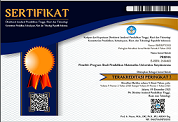PENERAPAN PENDEKATAN PROBLEM POSING TERHADAP PENINGKATAN KEMAMPUAN PENALARAN MATEMATIK SISWA SMP
Abstract
The purpose of this research is to examine the comparison of improvement of students' mathematical reasoning ability among the learning using problem posing approach with the use of ordinary learning. The method used in this research is experimental method with random sampling of class. The population in this study is all students of class VII SMP Negeri that exist in the city of Cimahi, while the sample is selected two classes VII from one junior high school in Cimahi. Instruments in this study consisted of two sets of tests in the form of a description problem. A set of questions to measure Early Mathematical Ability (KAM) and sort students into high, medium and low category (KAM). One other question is to measure the initial and final abilities of the aspects of mathematical reasoning. The instrument has fulfilled a good question in terms of validity, reliability, distinguishing power, and difficulty index. Based on the results of data processing, it can be concluded that the improvement of students 'mathematical reasoning ability using problem solving approach is better than ordinary learning, increasing students' mathematical reasoning ability which is higher than KAM or low, but KAM mathematical reasoning is no better than KAM low, the next result there is interaction between learning approach with KAM to mathematical reasoning. From these interactions, it is found in high KAM that the improvement of students 'reasoning ability using learning approach of problem posing is better than ordinary learning, but in low KAM there is no difference in improving students' mathematical reasoning ability among the learning using problem posing approach with ordinary learning.
Â
Keywords: Reasoning, Problem Posing
Full Text:
PDFReferences
Akay, H. & N. Boz. (2010). “The Effect of Problem Posing Oriented Analyses-II Course on the Attitudes toward Mathematics and Mathematics Self- Efficacy of Elementary Prospective MathematicTeachersâ€. Australian Journal of Teacher Education, Vo l 35, 1
Hendriana, et.al., (2017). Hard Skill dan Soft Skill Matematik Siswa. Bandung : Refika Aditama
Herawati, O. D. P. (2010). Pengaruh Pembelajaran Problem Posing Terhadap Kemampuan Pemahaman Konsep Matematika Siswa Kelas XI IPA SMA 6 Palembang. Jurnal Pendidikan Matematika Volume 4. No.1.
Juano, A. & Pardjono. (2016). Pengaruh Pembelajaran Problem Posing Terhadap Kemampuan Berpikir Kritis dan Komunikasi Matematis Siswa Kelas V SD. Jurnal Prima Edukasia Volume 4- Nomor 1, (46-53)
Nurafifah, D. S. (2012). Pendekatan Problem Posing dengan Latar Belakang Kooperatif. Jurnal Gamatika. Vol II No.2
Persada, A. I. (2014). Pengaruh Pendekatan Problem Posing Terhadap Kemampuan Komunikasi Matematika Siswa Kelas VII. Jurnal EduMa Vol.3 No.1 Juli 2014
Rosnawati, R. (2013). Kemampuan penalaran matematika siswa SMP Indonesia pada TIMSS 2011. In Prosiding Seminar Nasional Penelitian, Pendidikan dan Penerapan MIPA (p. M-6). Yogyakarta: Fakultas MIPA, Universitas Negeri Yogyakarta. Retrieved from http://staffnew.uny.ac.id/upload/132001808/penelitian/Makalah+Semnas+2013+an+R+Rosnawati+FMIPA+UNY.pdf.
Thobroni, A & Mustofa, A. (2011). Belajar dan Pembelajaran. Yogyakarta: AR-Ruzz Media
DOI: https://doi.org/10.35194/jp.v7i1.360
Refbacks
- There are currently no refbacks.
Copyright (c) 2018 PRISMA
Prisma Indexing :Â

PRISMA by UNIVERSITAS SURYAKANCANA is licensed under a This work is licensed under a Creative Commons Attribution-ShareAlike 4.0 International License.Based on a work at https://jurnal.unsur.ac.id/prisma.


1.jpg)








